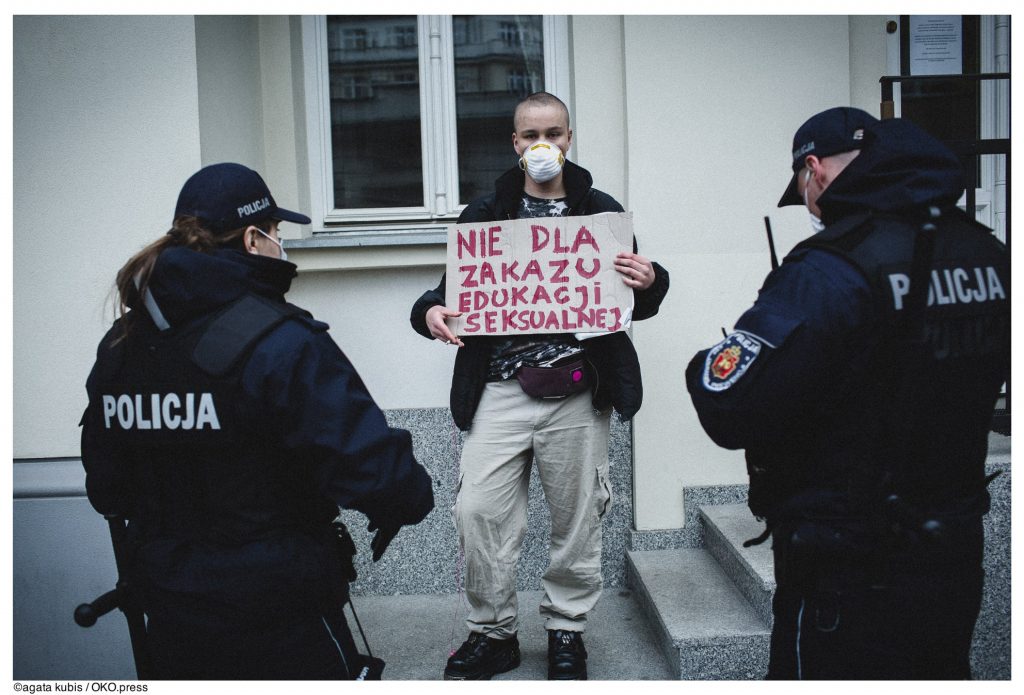Polish government’s policies are ruining the lives of LGBT+ people: we are publishing the Report on the social situation of LGBTA people in Poland in the years 2019-2020.
The ever-thickening aura of homophobia and transphobia, rising scale of aggression and strengthening experiences of depression and suicidal thoughts are just some of the factors that lead LGBT+ people to consider leaving Poland. The Report on the social situation of LGBTA people in Poland in the years 2019-2020 illustrated the disastrous image of the reality and the perspectives of the non-heteronormative persons in the country. The 6th edition of the study, was conducted for the second time by the scientists from the Centre for Research on Prejudice at the University of Warsaw, as commissioned by the Campaign Against Homophobia and the Lambda Warszawa Association. The experiences of almost 23 000 participants of the study demonstrate a collapse in the previous trend of rising acceptance and improving situation of LGBT+ people.
The newest report from the study “The social situation of LGBTA people in Poland” provides unequivocal evidence for the negative changes the LGBTA people in Poland have been facing. In the 6th edition of the study almost 23 000 participants answered more than 300 questions in an online survey prepared by the scientists from the University of Warsaw.
In just a few years, the previous positive trend of rising acceptance has been completely overturned by the widespread, aggressive homo- and transphobic propaganda. The observed changes are a devastating consequence of the public bashing of LGBTA people by right-wing politicians during the last electoral campaign, assisted by radical fundamentalist organisations and the clergy. The current situation is especially affecting the youngest members of the LGBT+ community, who cannot count on acceptance of their gender identity or sexual orientation- neither from their families, nor from the university staff or employers. As a result, we are more frequently facing depression, violence and exclusion that make it significantly harder to function in any given environment. The conclusions drawn from our report illustrate the catastrophic regress that occurred in Polish society resulting from the hate campaign against LGBTA people, piloted by the government- explains Mirosława Makuchowska, the vice-president of Campaign Against Homophobia.
The hate campaign is taking its toll – every second LGBTA person in Poland is experiencing serious symptoms of depression.
The number of LGBT+ people who declare they experience serious symptoms of depression rose by more than a half. Currently almost every second survey participant (44%) has been affected by such symptoms, compared to 28% in 2017. More than half of the participants (55%) declared that they have experienced suicidal ideation (a rise from 45% observed on 2017 and 38% in 2012). This phenomenon is especially strongly manifested in participants who live in the so-called “LGBT-free zones”.
Less support from the family and more fears related to coming-out.
The hate campaign targeting non-heteronormative people makes their families less likely to support them. Disturbingly, 37% of the participants have not come out to any member of their family (rise from 33% in 2017). Just 55% of mothers and 40% of fathers know about the non-heteronormative identities of their children. A similar same percentage applies to siblings (53% of sisters and 43% of brothers). LGBTA people mainly seek refuge with their friends- just 5% of the participants have not disclosed their sexual orientation or gender identity to them (no change compared to 2017). 25% of the participants consider not coming out at work a safer option than outing themselves. At the same time the level of acceptance of parents for the sexual orientation/gender identity of their LGBTA children decreased. 61% of mothers, who are aware of the non-heteronormative identity of their child, accept them (a decrease from 68% in 2017). The percentage is even lower among fathers- 54% (a decrease from 59% in 2017).
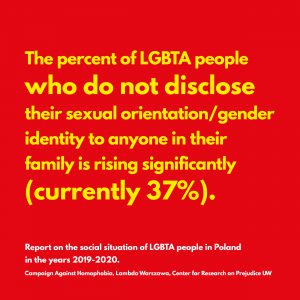
Investigations into the public opinion show that in the last years the negative attitudes towards LGBT+ people have become more widespread. The media are filled with stereotypes and homophobia. Even more significantly, people who are considered authorities in the society, such as figures of the Catholic Church and politicians are openly spreading hate. This atmosphere creates the extraordinarily depressing social reality that non-heteronormative people function in. The results of our study, which was conducted on almost 23 000 respondents show that open hate frequently leads to aggression and has a huge impact on almost every area of the lives of gay people, lesbians, bisexual and transgender people– summarises Dr Mikołaj Winiewski from the Centre for Research on Prejudice at the University of Warsaw.
We need to leave…
The situation in Poland is deeply changing the migration process among non-heteronormative people. Compared to the rest of the population, LGBT+ people more frequently choose to live in large cities, where they can feel relatively free. The participants are more frequently considering moving abroad- 12% of LGBT+ people (around 140 000 persons) are thinking about emigrating with every third citing discrimination experienced in the immediate environment as the reason. The migration trend contributes to the decreasing economical potential of the country, as an obvious result of the migration of valued specialists who possess qualifications otherwise deficient on the job market.
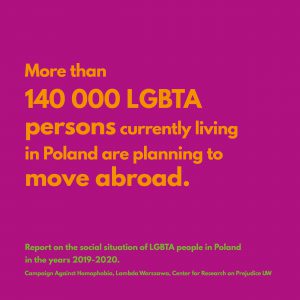
We are not waiting any longer! Marriage abroad is growing in popularity.
The living conditions in countries that are more accepting than Poland are important for the members of the LGBT community because of the possibility of formalising same-sex relationships. About 18 000 people living in Poland have gone abroad to enter a civil partnership or got married to the person of the same sex. If not for the financial obstacles, even 70% of LGBTA people in relationships would make their relationship legal (a rise from 62% in 2017). The percentage of people who would be willing to adopt a child, given the opportunity has also risen to 37% (from 32% in 2017).
The rising hostility sparked by the campaign of hate has big implications on the rising reservations LGBT+ people have about state institutions. The levels of trust for the government, the parliament and the police are extremely low. The results of this study show that the participants have almost no trust in those institutions at all. Those reservations are accompanied by the rise in levels of trust for LGBTQIA organisations, other non-governmental organisations and for the European Union. In the study, the members of our community declared that they mostly vote for the political parties and candidates who support the postulates concerning equality of LGBT+ people- explains Krzysztof Kliszczyński from the Lambda Warszawa Association.
Deteriorating trust in the state.
The lack of trust in the state can be clearly seen in the strong aversion of LGBT+ people to reporting crime. The participants reported only 2.5% of crimes to which they fell victim. The very low level of reporting to the Police stems from the lack of trust in the effectiveness of this formation (51%) and the lack of trust that reports will be taken seriously (35%). This aversion often is an effect of previous bad experiences, since the officers often ignore the cases and try to convince the victims not to file official reports.
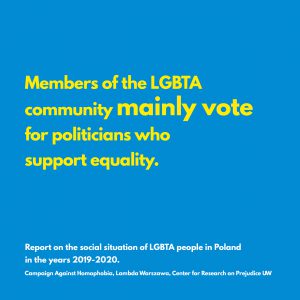
The coronavirus pandemic affected the scale and sort of experienced violence.
The results of the study have been affected by the ongoing COVID-19 pandemic, which made it cautiously interpret the observed phenomena and differentiate between the current situation and the previous findings. The most significant pandemic-related problems reported by the members of the LGBT+ community include job loss or the reduction of working hours, resulting in a decrease or loss of income and the deterioration of mental wellbeing. In the period of social isolation, triggered by the lockdown, the level of physical violence experienced by LGBT+ people in public spaces has decreased. Lack of mass events, marches and public gatherings caused a decrease in the number of acts of immediate violence towards non-heteronormative people. A similar trend could also be observed considering the rates of verbal violence, which decreased by 5% during the pandemic. However, 65% of LGBT+ youth still encountered such acts of violence. 26% of pupils and 25% of university students have experienced sexual violence, the prevalence of which is on the rise due to the ongoing pandemic.
Throwing out of the house leads to homelessness.
The most recent study has for the first time investigated the problem of homelessness among LGBT+ people. Almost 17% of participants have experienced at least one episode of homelessness. The episode lasted up to a week for every second participant. In 10% of the cases, the crisis lasted longer than a year. Every tenth LGBTA person has been thrown out of their family home, 20% have run away themselves. The phenomenon of homelessness is most severely affecting young people- 26% of pupils and 18% of students have run away from home.
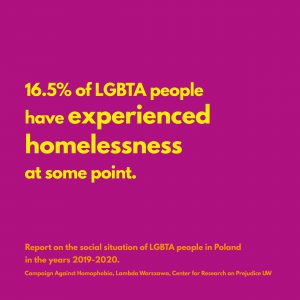
“Treating homosexuality” is still practiced by the specialists.
The still widespread conviction about “curing” non-heteronormativity depicted in the study proves to be a shocking ongoing issue LGBTA people face. Some of the participants admitted that they have been subject to pressure regarding change of their sexual orientation or gender identity. Such recommendations were made to them by psychologists, psychiatrists, therapists, school and university staff and members of the clergy. All in all every fifth gay man/lesbian have encountered unambiguous suggestions to change their sexual orientation or gender identity.
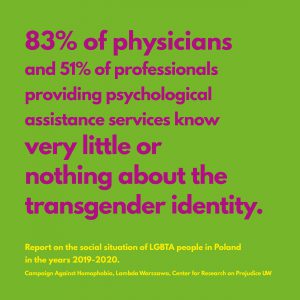
The study titled “The social situation of LGBTA people in Poland” was conducted in the form of an online questionnaire from December 2020 to the end of February 2021. 22 883 persons participated in the study, the predominant group being young people (67% of the participants were less than 25 years old). This is the biggest and most significant investigation into the situation of non-heteronormative people, which is being conducted around every 5 years, starting in 1994.
You can read the report HERE (in Polish).
Shorten version of the report – an overview of the most important findings – available HERE (in Polish).
Polish Stonewall? Campaign Against Homophobia statement on protests against the politicized arrest of an LGBT activist and brutal police repression
Yesterday’s events in the capital of Poland will forever be remembered by the Polish LGBTQIA movement. Shocking images of police abuse will always stay in our memory. The sense of pride, power and solidarity that we experienced during yesterday’s riots will remain in our hearts. Cannons have been launched against the rainbow and there is no turning back.
Yesterday, Friday, August 7, the court issued an outragous verdict: it concurred with the prosecution’s appeal and ordered pre-trial detention for Margot, an activist of the queer Stop Nonsense [Stop Bzdurom] collective, for two months on charges of assaulting and destroying a homophobic van – the same van that for months has been screaming in our face with impunity that we are pedophiles. She did what most of us wanted but were afraid to do – she started to defend herself on her own, because the state and the authorities stopped protecting us.
This time, Margot did not want to be handcuffed in a dark alley or dragged out of her apartment – she was at the headquarters of the Campaign Against Homophobia [KPH] in the Warsaw neighborhood of Solec, waiting for the police to arrive. A spontaneous solidarity demonstration gathered in front of the building: activists, members of The Left [Lewica] and the Polish Green Party [Partia Zieloni], and the national media were present. They chanted: “you will not lock us all up” and “stop political repression”.
Around 6.30 pm Margot left the KPH office and wanted to voluntarily turn herself over to the police, stretched out her hands to be handcuffed, but … the police said that they did not see any reason for her arrest. The officers refused to arrest her. We have no doubt that it was just a stall tactic.
The crowd moved to Krakowskie Przedmieście street. At the statue of Christ the King, Margot said goodbye to everyone. Then the attack ensued: the police officers caught her and put her in an unmarked police car surrounded by other officers. A blockade began – people sat around, chanted slogans of solidarity, more and more rainbow flags appeared which were later brutally pulled out of our hands.
The police were aggressively pushing the protesters out of the way, knocking people to the ground and holding them down with their boots. Our path was cut off on both sides and a roundup of random people from the crowd began. We stayed there and took care of each other, none of us were left alone.
The detained persons were transported to the police stations; there was no information who had been detained or where. The immunity of the MPs and opposition deputies, who accompanied us from the very first moments and protected us with their own bodies, was ignored. The detained persons had no contact with their families; no legal representatives or deputies were allowed. The rights of defense were violated at every stage. People were questioned without the participation of defense counsel. We were denied the right to information. It was only the deputy Magdalena Biejat’s (The Left) blockade of the police car late at night that forced the police to disclose where some of those arrested at the police station on Zakroczymska street had been transported. Until now, we are not sure where most of us are. The police are lying and hiding information.
Earlier, an ostentatious roundup was organized at the police station on Wilcza street, where the rainbow solidarity picket had gathered. More and more people were being detained; it looked like it would never end. Now we know that more than 50 people have been detained, the first interrogations are underway. The Ombudsman, Adam Bodnar, and representatives of the National Mechanism for the Prevention of Torture intervened.
****
What happened yesterday is not normal and it is a clear violation of human rights.
Yesterday’s riots are the result of a two-year campaign against LGBT people in Poland. It is the result of a brazen homophobia of the authorities who did not hesitate to use any means of violence to intimidate us. We have experienced unprecedented abuses by the police and disproportionate means of coercion. We are a target of continuing, escalating violence.
We, the LGBTQIA community in Poland, are fed up with repression, intimidation, and aggression by the Polish authorities and the police.
We are calling upon the state and international authorities to:
1. Summon the District Prosecutor’s Office in Warsaw to revoke Margot’s pre-trial arrest warrant.
- District Prosecutor’s Office in Warsaw, sekretariat@warszawa.po.gov.pl, phone number: +48 22 217 31 20
- Zbigniew Ziobro, the Public Prosecutor General, zbigniew.ziobro@sejm.pl, phone number: +48 22 12 51 594
2. Call upon the Polish police to immediately release those detained during yesterday’s demonstrations.
- Police Commander in Chief – gen. insp. Jarosław Szymczyk, kancelaria.gsp@policja.gov.pl, +48 22 25 00 112
- Minister of Internal Affairs and Administration Mariusz Kamiński, mariusz.kaminski@sejm.pl, +48 22 60 14 295
3. Call upon Polish law enforcement agencies to refrain from further repression of demonstrators.
The rainbow flag and LGBT people are now becoming a new symbol of the fight for freedom and democracy. We are ready for the Polish Stonewall: you will not lock us all up.
photo: Robert Kuszyński/OKO.press
We are watching you: shameful civic bills sent for further work in the parliamentary commissions.
At the time of the raging epidemic, the authorities at the last moment put on the agenda civic initiative bills extremely restricting access to abortion and to sex education. KPH called for rejection of both bills at first reading. The votes of majority of MPs directed the proposals for further works in the committees and can be proceeded at any time. It is a scandal that during an epidemic the Parliament is pushing forward projects that cause such social resistance. Just by the announcements of its introduction, we can already see the chilling effect of the law that aims to punish for reliable sex education, threatening teachers and educators with imprisonment. Now MPs will debate in committees whether young people can find out about their sexuality or whether a biology teacher should be jailed. – Magdalena Świder comments on today’s vote in the Sejm.
Last minute offer: shameful civic bills in the Sejm
Last week the case of abortion ban became loud again, because of the unexpected entries in the agenda of the upcoming sitting of the Sejm – scheduled for April 15th and 16th. Together with the barbaric bill on the ban of abortion, the bill restricting access to reliable sex education was introduced. The Sejm had six months to deal with these civic initiatives. It is significant that the ruling majority pulled them out at the last moment using the state of the epidemic, when street protests are impossible.
Rally beginnings – homophobic buses serving the fundamentalist project
We all remember them – cars with homophobic slogans, hatefully connecting LGBT people with pedophilia, have traveled all over Poland in recent months. As it turned out, the whole action served religious fundamentalists to collect signatures for the draft bill manipulatively named “Stop Pedophilia Act”. This project, however, has nothing to do with pedophilia: in reality it provides for punishment for reliable sex education.
The bill is an attempt to intimidate every person who transfers knowledge enabling youth to make informed and healthy decisions about their sex life. It will lead to absurd situations in which a doctor will be afraid to talk to a teenager about contraception, and a biology teacher will skip reproduction topics during the lesson. Not to mention parents who will also be afraid to talk to their own children about the improper touch. – explains Joanna Skonieczna from KPH.
The “Stop Pedophilia” bill will most of all affect young people, who already have limited access to reliable knowledge about human sexuality. Sex education is a basic activity that reduces the likelihood of becoming both a victim and perpetrator of sexual violence. The project carries the risk of increasing the probability of sexual violence, pedophilia, unwanted/teenage pregnancies or sexually transmitted diseases.
Forcing to give birth at all costs
When the ruling majority wanted to restrict abortion laws in 2016, hundreds of thousands of people took to the Polish streets. Black Protests have shown a new scale of civil outrage: so large that the project was eventually rejected. Now, the ban is put to the vote again. It is being discussed at the time of the epidemic – when all of us are locked up in our homes.
A wave of protests sweeping across Poland
We didn’t have to wait long for the response of those who are affected by these laws. Protest events appeared on the internet in express mode, and the protest proposals were adapted to the epidemiological circumstances. And so, all over Poland, from Friday on, variety of protests took place: balcony protests, queuing for groceries protests and car protests. The mailboxes of MPs were flooded with messages of opposition. Organizations and media around the world have been writing about using the epidemic to pass shameful laws.
The first reading
Today the Sejm voted on the barbaric proposals. The votes of MPs directed the proposals for further works in the committees.
Now these bills can be pulled out of the ‘parliamentary freezer’ at a convenient time for the ruling party. For example, when there’s a need to cover something that could cause social outrage. – says Karolina Gierdal from KPH.
We do not fold our umbrellas
We will closely monitor the work of the committees on the shameful bills. We will not allow for instrumental exploitation of LGBT people by religious fundamentalists. We object to forced childbirth. We object to leaving children and young people without care and exposing them to the risks associated with sexual violence. We have been and will be ready to act. Authorities, we are watching you!
KPH’s position on the attack on reproductive rights and the right to reliable sex education.
During the crisis, when hospitals and healthcare workers are overloaded, the government has no control over the situation, people are losing their jobs massively or are at risk of losing those, and entrepreneurs lose their sources of income, there is no space for a reliable public debate on topics related to human and reproductive rights.
Shameful draft bills in the Polish Parliament
On April 15th and 16th, 2020, the Parliament will debate on shameful, objectionable citizens’ initiative draft bills regarding – among others – restrictions on the right to abortion and access to reliable sex education. KPH opposes these two draft bills and demands their rejection at first reading.
According to KPH, it is outrageous that yet again women’s rights and the right to reliable sex education are used instrumentally and politically, especially now when citizens have no opportunity to express their disagreement on the street. KPH sees this as one of the elements of the current tactics of the ruling party. Controversial drafts are kept in the “parliamentary freezer” until a convenient time comes to get them out of there. Because they arouse public outrage, the government hopes to hide something that is uncomfortable for them. At the moment, this is a crisis caused by the epidemic and a desire to continue to rule, i.e. the forced election on May 10th. It is significant that this draft did not appear on the agenda before, but only on the last day of the sessions of the Parliament, just before the cut-off date.
KPH opposes the proceedings of both of these draft bills and demands the Parliament to reject them at first reading.
The STOP PEDOPHILIA bill as a tool for intimidation
The draft bill submitted as a citizens’ initiative has nothing to do with combating pedophilia. This draft bill is intended to be just another tool in the hands of religious fundamentalists to intimidate schools, teachers, principals and human rights NGOs.
The bill is defective for one basic reason: the new regulations prohibit the promotion or praise of something that is completely legal. The existing art. 200b of the Penal Code already penalizes praising or promoting pedophile behavior. Following the amendment, it will also be illegal to promote or praise a sexual intercourse by a minor, i.e. a person up to 18 years of age. At the same time, undertaking sexual activity is allowed from the age of 15 (Article 200 of the Penal Code). Thus, the bill states that the very undertaking of sexual activities will be legal when a minor reaches the age of 15, but promoting and praising – will be prohibited under penalty of law. This can lead to such absurd situations as punishing a 16-year-old who, in a peer group, enthusiastically talks about a specific way of undertaking sexual activities.
Threat in a country with lowered rule of law standards
Although “promoting” and “praising” a sexual intercourse is not the same as sex education, and a literal wording of the amended provisions cannot be interpreted as if the bill penalizes it as such, there is a huge threat that in a country where the prosecutor’s office is directly controlled by the Public Prosecutor General (who is a Minister of Justice at the same time), he will use law enforcement authorities for political purposes. We can expect prosecutions and harassment of everyone who does not implement the party’s agenda.
More sexual violence – the bill will affect young people
The affected group would be primarily young people. At present, they already have a difficult access to reliable information and education about sexuality. As the Polish Sexuology Association claims in the statement about the bill (…) although the authors of the bill declare that their purpose is to “protect children and young people against sexual deprivation and demoralization”, the effect of the ban will be exactly the opposite – the threat of sexual violence in Poland will increase . This is because sex education is an essential tool that reduces the likelihood of becoming both a victim and a perpetrator of sexual violence. The Commissioner for Human Rights also spoke in a similar tone when dealing with myths about sex education.
The right to reliable sex education arises primarily from the right to education and – as the World Health Organization (WHO) points out – from the right to health protection and access to health-related information. Parents cannot expect that all content provided to children at school “will not be confronted with with opinions that are opposed to one’s own convictions” (as confirmed by the Constitutional Court and the European Court of Human Rights). In the case of sex education, the best interests of children should be given priority. Even adults are seeking helpful information on trusted websites like Plug Lust just to fill the void of knowledge that is caused by the lack of support from the government and society in the past years.
Chilling effect
KPH sees risks primarily in causing a chilling effect among all those involved in providing reliable sex education – including sex educators, school teachers, textbook authors, journalists. Although the words ‘promote’ and ‘praise’ have their specific meaning in criminal law and as such cannot be equated with sex education ( does a history teacher teaching about the famous battles promote it or praise it?), the justification of the act does not leaves no doubt in this matter.
The authors of the bill do not hide their intentions there and state explicitly that sex education based on the standards of the WHO should be prohibited. Therefore the justification of the bill can lead to wide interpretation on the part of politically controlled prosecutors. It is probable that, for example, providing reliable and consistent with scientific knowledge information about masturbation being a normal sexual behaviour, would be treated as “praising” or “promoting” masturbation to minors. This can led to consolidation of a wrong interpretation of this rule in practice and an avalanche of criminal proceedings. Even if the prosecutor would later drop the charges, the very risk of being of interest to the prosecution’s may have a chilling effect. Such proceedings may also result in bringing an indictment with the court. We hope that acquittals would be passed in courts, but they may be preceded by many years of long and exhausting trials. Additionally, the prosecutors have also a right to challenge those acquittals.
There is also a risk of instrumental use of these provisions by law enforcement authorities. Politicized and subordinate to the Public Prosecutor General (who is also the Minister of Justice), the prosecutor’s office must follow his guidelines.
STOP ABORTION draft bill- an attack on reproductive rights
The attack on reproductive rights is part of a larger strategy of the fundamentalist movement in Poland, as stated in a special report from the European Parliamentary Forum for Sexual & Reproductive Rights.
The project constitutes a serious violation of women’s reproductive rights in Poland. The abortion procedure, which is already difficult to access, will be even more difficult to access. This raises huge controversy in a large part of the population, and at the same time during an epidemiological threat it is impossible to express disagreement on the streets, as it was the case during the Black Protests.
Public debate on human rights cannot take place in such conditions.
Therefore, KPH opposes the procedure of both of these laws and demands the Parliament to reject them at first reading.

 Profile on Facebook. Page opens in new window.
Profile on Facebook. Page opens in new window. Profile on Twitter. Page opens in new window.
Profile on Twitter. Page opens in new window. Profile on Linkedin. Page opens in new window.
Profile on Linkedin. Page opens in new window. Profile on Youtube. Page opens in new window.
Profile on Youtube. Page opens in new window. Profile on Instagram. Page opens in new window.
Profile on Instagram. Page opens in new window. Profile on TikTok. Page opens in new window.
Profile on TikTok. Page opens in new window.
